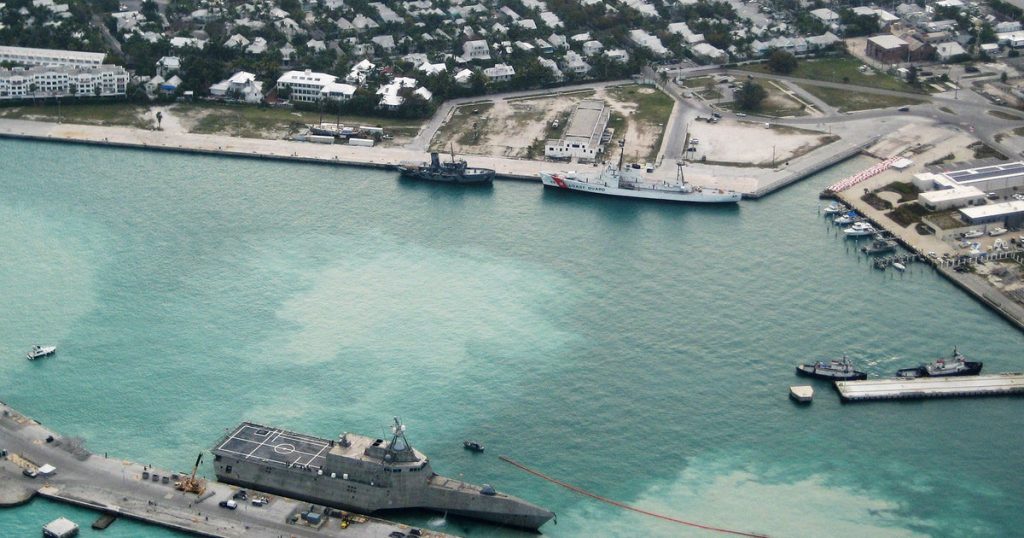A significant incident occurred at the U.S. Naval Air Station in Key West, Florida, when the wife of an active-duty Coast Guardsman was arrested by federal immigration authorities. This arrest happened during a routine security check on the day the couple was moving into their new housing on the base. The Coast Guard confirmed that the arrest stemmed from a lawful removal order related to the woman’s expired immigration status.
| Article Subheadings |
|---|
| 1) Background of the Arrest |
| 2) Incident Details |
| 3) Response and Cooperation |
| 4) Reactions to the Arrest |
| 5) Broader Implications on Immigration Policy |
Background of the Arrest
The arrest of the Coast Guardsman’s wife has raised various questions regarding immigration enforcement within military communities. According to officials, the woman’s work visa had expired in 2017, and subsequent actions had marked her for removal from the United States in the years that followed. More recently, she and her husband, a member of the United States Coast Guard, were married earlier this year, just before moving into base housing. This context is critical as it highlights the intersection of immigration issues and military family affairs, which can often be both sensitive and complex.
Incident Details
The incident unfolded on what was supposed to be a joyous day for the couple as they prepared to move into their new residence at the naval air station. As they requested access through the visitor control center, a routine security check flagged the woman’s name due to her immigration status. Once her information was confirmed, base personnel referred the case to the Naval Criminal Investigative Service (NCIS) for further examination. Following NCIS protocol, Coast Guard security personnel received approval from the base commander to enter the installation and proceeded to the couple’s new home. This step emphasized both the seriousness of the unauthorized status and the procedures layered within military installations.
Response and Cooperation
In response to the incident, officials from various government bodies were involved, including the Coast Guard and Homeland Security Investigations (HSI), a division of Immigration and Customs Enforcement (ICE). The Coast Guard spokesperson, Lieutenant Commander Steve Roth, stated that the Coast Guard routinely collaborates with HSI to enforce federal laws, which includes immigration enforcement. This level of cooperation signals how closely military entities adhere to federal regulations, particularly regarding security. The Navy also expressed that it “fully cooperated with federal law enforcement authorities on this matter,” underscoring the gravity with which security and access to naval installations are treated.
Reactions to the Arrest
The arrest has triggered a range of responses from various stakeholders, especially within the military community. Many are concerned about the implications of conducting immigration enforcement in military settings, which are typically seen as safe havens for service members and their families. This event has turned the spotlight on the complexities surrounding immigration laws as they apply to military spouses, a demographic often overlooked in broader policy debates. Observers are also examining how such actions could potentially impact the morale of service members and their families, especially those who may face similar situations.
Broader Implications on Immigration Policy
The incident stands as a potent example of the ongoing tensions surrounding immigration policy in the United States. Under the previous administration, immigration arrests were prioritized, leading to heightened scrutiny in various areas, including military installations. While this arrest does not appear to be part of a larger immigration sweep, it does raise questions about how immigration laws are enforced in sensitive environments such as military bases. As policies surrounding immigration continue to evolve, the ramifications of such actions will likely resonate through not just military communities but also the broader American populace.
| No. | Key Points |
|---|---|
| 1 | The wife of an active-duty Coast Guardsman was arrested during a routine security check. |
| 2 | The woman’s work visa expired in 2017, leading to her being marked for removal. |
| 3 | NCIS and Coast Guard personnel collaborated with HSI for the arrest procedures. |
| 4 | The arrest has sparked reactions regarding immigration enforcement in military communities. |
| 5 | The incident highlights ongoing tensions surrounding immigration policy in the U.S. |
Summary
In conclusion, the arrest of the Coast Guardsman’s wife during a routine security check at a military installation illustrates the complexities and tensions surrounding immigration enforcement within military contexts. It highlights the challenges military families face amidst stringent federal immigration policies and raises critical questions about security practices within the armed forces. As this situation unfolds, the implications will likely resonate within both military circles and broader public discussions on immigration policy.
Frequently Asked Questions
Question: What led to the arrest of the Coast Guardsman’s wife?
The arrest occurred due to the woman’s expired work visa, which had been marked for removal from the United States following subsequent legal actions.
Question: What was the reaction from base officials regarding the arrest?
Base officials confirmed that they cooperated fully with federal law enforcement and emphasized the seriousness of security and access procedures on naval installations.
Question: How do such incidents affect military families?
Incidents like this can create tension and uncertainty among military families, who may feel vulnerable regarding immigration enforcement in their communities.


